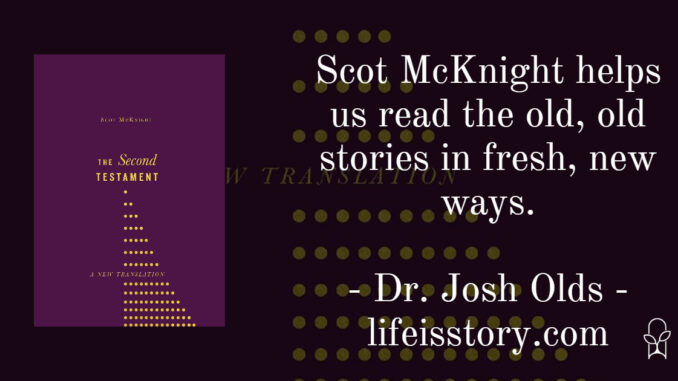
Also by this author: A Church Called Tov: Forming a Goodness Culture That Resists Abuses of Power and Promotes Healing, Five Things Biblical Scholars Wish Theologians Knew
Published by IVP Academic on June 20, 2023
Genres: Academic, Non-Fiction, Theology
Buy on Amazon
Goodreads

Experience the New Testament afresh in Scot McKnight's bold translation. Typical translations of the New Testament make the biblical text as accessible as possible by using the language of our own day. At times this masks the distance between the New Testament text and modern readers. Scripture continues to speak to us but it speaks as an ancient text to the modern world.
New Testament scholar Scot McKnight offers a translation of the New Testament with a daring approach to the ancient text. Clever in its expression and at times stunning in its boldness, The Second Testament will challenge readers to experience God's Word anew.
For new believers, the sheer number of Bible options can be overwhelming. Not only are there innumerable translations, but there are also a wide array of study Bibles for every demographic. A search on Christianbook.com shows that they sell 9,328 different types of Bibles. So why one more?
The Second Testament, translated by Scot McKnight, is a complete and original translation of the New Testament that follows John Goldingay’s 2018 translation of the Old Testament called The First Testament. The two books are only related in spirit. Goldingay and McKnight didn’t collaborate on the project. Rather, after the success of The First Testament, IVP contacted McKnight about doing a follow-up. That means that while the books are connected, readers may find some differences in translation choices. As the NT contains many quotes from the OT, that’s an important facet to remember.
But why introduce another translation? So that we can read the old, old stories in fresh, new ways. That doesn’t necessarily mean coming to new interpretations of the text (except when warranted!) but rather hearing the words of Scripture in a different cadence that might help readers better understand and live out its precepts. In the preface for the Second Testament, McKnight writes that his goal “is to help English readers experience what the Greek reader experiences in reading the New Testament in Greek.” Rather than striving for dynamically equivalent translations, McKnight opts for a more formal and literal tactic, attempting to captures more of the Greek nuances lost in typical English renderings. One of the most obvious ways this is done is in the use of Greek names and places, with Anglicized versions in brackets. Matthew begins: “Book of the genesis of Yesous Christos, descendent of Dauid [David], descendent of Abra’am.”
As with any translation, The Second Testament makes certain exegetical decisions. For example, in 1 Corinthians 11—a notoriously difficult to interpret passage—McKnight translates the discussion about women worshipping as a back-and-forth conversation with Paul quoting his opponents and then answering their arguments. So 1 Cor. 11:5 “every woman who prays or prophesies with her head uncovered dishonors her head—it is the same as having her head shaved” changes from being a thought of Paul to a contention from his opponents which he then answers in v. 6. This introduces its own set of interpretational difficulties, but does show how a text might have been read by its original audience that is drastically different from how it is read today. Similarly, in another contentious passage in Corinthians where Paul says “women should remain silent in the churches,” The Second Testament excises those verses completely with a footnote stating that some ancient manuscripts don’t contain those verses and McKnight does not believe them to be genuine to the original message. If they are original, McKnight also offers a translation in the footnote that uses the same conversational construct as the 1 Cor. 11 passage. What you think of these decisions probably is up to how you interpret those verses. I appreciate that McKnight brings to the surface that doing the work of translation is inherently an exegetical and theological work. He doesn’t hide that but instead talks about his decisions with clarity.
What Eugene Peterson did in The Message, Scot McKnight has done from the opposite perspective in The Second Testament. Peterson took the text and modernized the idioms and made the language contemporary. McKnight has taken the same text and offered an English translation while attempting to retain the Greek flavoring. It’s a worthy supplement to more traditional translations.
